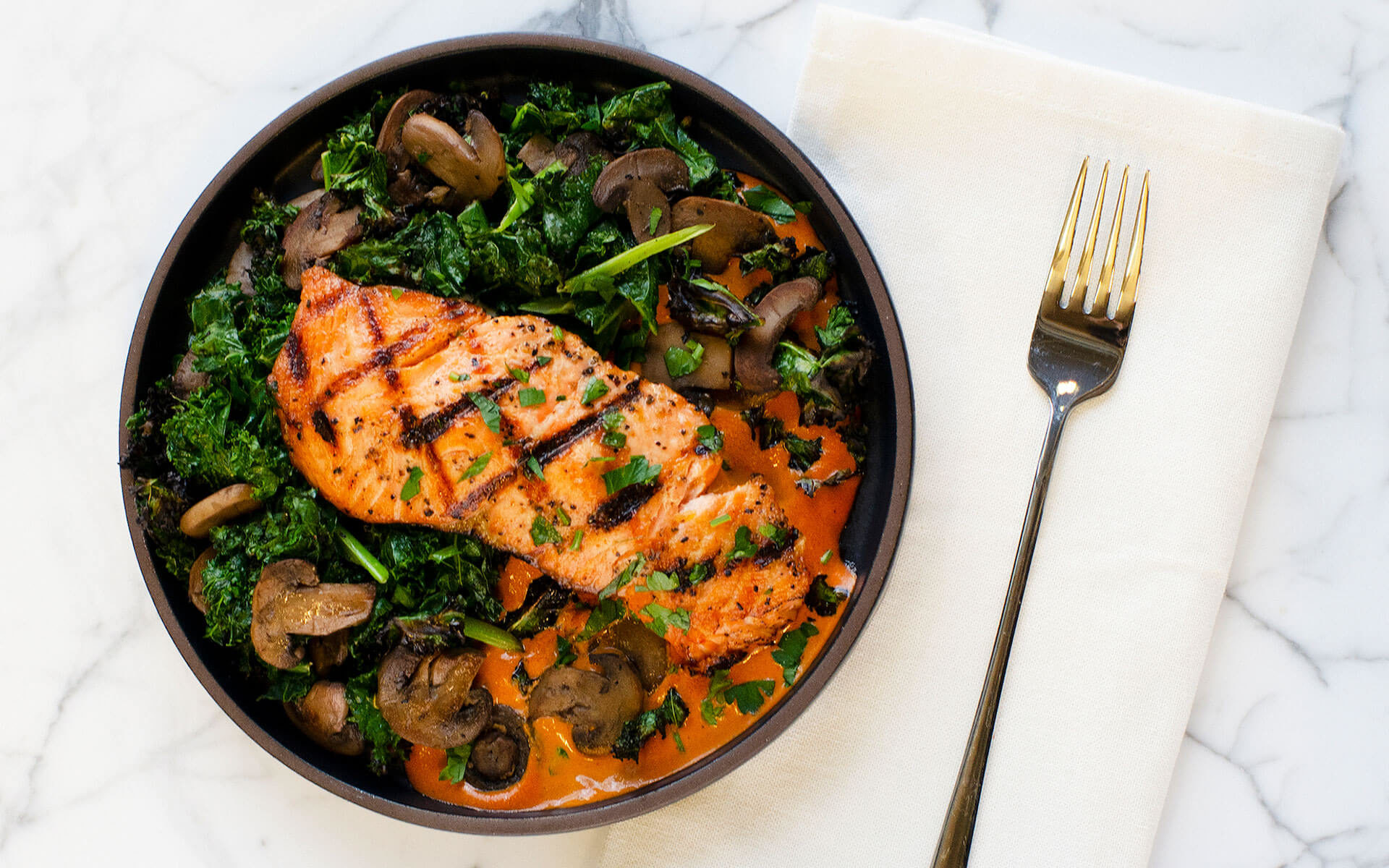The ketogenic diet, or keto, is definitely having its day in the sun right now. We recently rolled out our own keto-friendly plan! It’s the diet du jour of many progressive nutritionists and popular biohackers. But what is it and what are the benefits & possible pitfalls? Here’s the real deal.
the basics
Keto is a high fat, moderate protein, very low carb diet. This typically translates to 75-80% of one’s calories coming from fat, 15-20% from protein, and only 5-10% from carbs. Most experts recommend a daily intake of 20-50 grams of carbs, depending on your activity level. Our keto-friendly meal plan has 30 grams of net carbs per day. You can find out more about that here.
Under normal conditions (at least as the American diet stands today), the carbs you consume (and, to some extent, excess protein) are broken down into glucose. Glucose, a simple sugar, provides energy for cell functions. After food is digested, glucose is released into the bloodstream. In response, the pancreas secretes insulin, which directs the muscle and fat cells to take in glucose. Cells obtain energy from glucose or convert it to fat for long-term storage.
In the absence of carbohydrates in your diet, your blood sugar & glycogen stores become depleted and your body looks to non-glucose forms of fuel. Your liver converts fat into ketones (i.e. ketogenesis, or the making of ketones) to use as energy instead. In this low insulin, fat-adapted state, your body can easily access and burn stored body fat. An added benefit is that by avoiding grains and processed sugar, you can reduce inflammation and improve the balance of good & bad bacteria in your gut, which can lead to improved mood, skin health, fertility, digestion, and more.
It’s important to note that once someone is solidly in ketosis, consuming large amounts of fat becomes less important since your body can now use your body fat for fuel. It’s much more important to focus on keeping carbs low than it is to load up on fat. There are certain exceptions when it comes to therapeutic approaches, so the information outlined here is intended for the average person trying keto for weight loss, improving blood sugar control, or some of the other lifestyle-related benefits.
Keto should not be confused with ketoacidosis, a life-threatening condition characterized by extremely high blood sugar & ketone levels that almost always occurs in Type 1 diabetics or those with poorly functioning livers.

the benefits
Most of keto’s recent burst of popularity has to do with its aforementioned fat-burning boost, which comes from the manipulation of insulin and from the increased satiety of dietary fat. But keto boasts other serious health benefits too. It’s a trusted therapeutic treatment for epilepsy, and there’s also promising research showing its ability to enhance neurological function, protect against cognitive decline, reduce inflammation and oxidative damage, and slow or stop the growth of cancerous tumors. The difference between running on sugar and running on ketones is often likened to the difference of a gas vs. hybrid car. Glucose is quick to burn, but it produces excessive free radicals (exhaust) as it does. Ketones are more efficient, providing more cellular energy than glucose.
Other benefits include reduced hunger & cravings (sign.us.up!), improved insulin sensitivity & better blood sugar control, improved energy levels (no 3pm crash!), and fat loss. It’s important to note that benefits will vary depending on the person and their unique health and lifestyle factors. There are also many different ways to keto, from carnivore-based eating to a more plant-based approach, and this can impact potential benefits as well.
the side effects & potential pitfalls
Keto isn’t without its pitfalls or difficulties. If you abruptly reduce your carb intake to just about nil, you may suffer from symptoms often referred to as the “keto flu.” Not only will this leave you feeling less than awesome, but it could also discourage you from continuing at all.
Of longer-term concern with keto is diet quality. Done correctly, a healthy keto diet will consist of lots of well-raised animal proteins (like grass-fed beef, pastured chicken, and wild-caught seafood), healthy fats (including avocados, extra virgin olive oil, nuts/seeds, olives, coconuts, etc) and non-starchy vegetables for fiber and micronutrients.
the takeaway
As with anything else, there is no one-size-fits-all. The keto way of eating may not be for you, and that’s totally okay. Sometimes, you’ve got to try out a few different things to find your perfect fit.
If keto sounds like something you can manage (and maybe even enjoy– hello, avocado), then go for it! Load up on plenty of non-starchy veggies, especially greens, and vary your sources of plant- and animal-based fats. And know that you can rely on us to make it super easy to keep it keto-friendly:
- breakfast platter
- chicken piccata
- naked beef (pro tip: add ghee to those green beans for some extra fat & flavor)
- romesco chicken
- …And more! Everyone’s needs are individual, so check out our menu and see what works for you. Remember that you can always add fat from avocado, olives, ghee, olive oil, MCT oil, coconut oil, and nuts!
Want to read more abut how to grocery shop while on a keto diet? Check out our keto shopping post here or try out keto without all the meal prep by signing up for our keto-friendly plan!
sources:
https://www.ncbi.nlm.nih.gov/pubmed/25686106
https://www.nature.com/ejcn/journal/v67/n8/abs/ejcn2013116a.html
https://www.mindbodygreen.com/articles/pros-and-cons-of-the-ketogenic-diet
https://www.marksdailyapple.com/the-definitive-guide-to-keto/





Leave a Reply
2 Comments
Great blog post! The Keto way of eating really appeals to me as I can do without the carbs and crave healthy fats and protein, but I also have slightly high cholesterol (hereditary) and worry that a diet like this would not help me in that regard. I suppose I would just need to be conscious of more plant-based fats than animal-based fats, and minimize the ghee and butter, and try to use more plant-based oils, yes? Thoughts?
thanks so much for this information. I just started the low carb meal plan hoping it could help me with starting the keto diet.